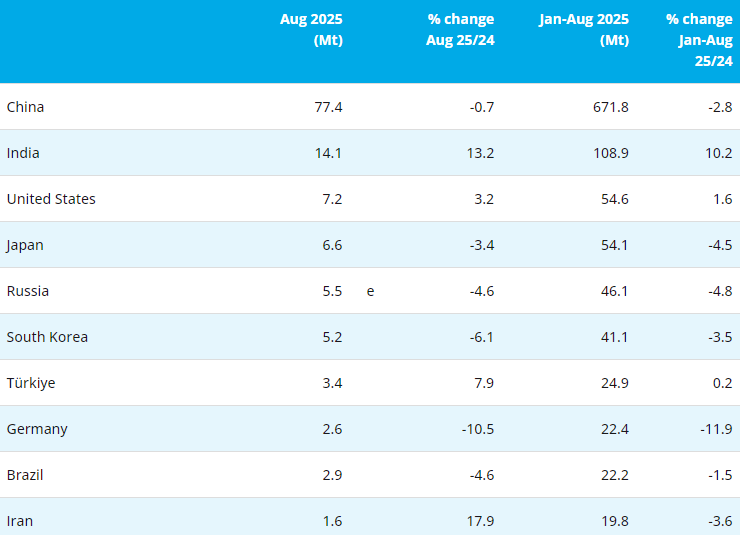[Ferro-Alloys.com] It is reported that China is set to release new plans soon to slim down bloated industries from steel to shipbuilding, but applying measures on the ground will be tough after years of lax oversight during a stimulus-fueled rush to expand in Asia's biggest economy.
The new rules, which will also target aluminium, cement and glassmaking, could be announced within weeks. Despite fairly resilient demand, all these sectors have been hit by overcapacity and failure to rein in production gluts could put more pressure on already weak markets.
The global raw materials sector is buttressed by Chinese buying and while efforts to streamline industry could make the long-term outlook more sustainable, they might hit demand. Major sellers to China of iron ore, coal and other staples include Rio Tinto, BHP Billiton and Vale.
China's new government is trying to restructure key areas of the economy, including new efforts to rein in excess credit growth that has led to asset bubbles.
But in tackling industrial capacity Beijing will be wary of moving too fast to avoid social strife from excess job losses.
Mr Li Xinchuang deputy secretary general of theChina Iron and Steel Association which includes 80 mills accounting for about 80% of China's steel output and is involved in policy discussions said that "Solving this problem is going to be extremely hard and it's going to take a long time, and you can't just expect everything to change with just one policy.”
Beijing has sought to tackle overcapacity in sectors such as aluminium and steel for about a decade, but plans have faltered due to resistance from local governments anxious to protect growth and boost revenues.
In a sign Beijing may be getting more serious, cutting capacity is becoming a performance target for local officials.
In the past, the central government tended to rely on quasi-governmental industry bodies like CISA, with limited formal powers to drive plans through.
There has been little economic or legal incentive for local authorities or enterprises to comply, and few formal regulations to determine what projects are legal or not.
The latest plan is likely to seek to block new projects, push for more mergers and acquisitions and raise targets to shut old capacity. China was previously committed to closing 7.8 million tonnes of outdated steel and 273,000 tonnes of aluminium capacity in 2013.
The plan will be supported by steps designed to cut air pollution in cities by closing or relocating heavy industry.
The new rules, which will also target aluminium, cement and glassmaking, could be announced within weeks. Despite fairly resilient demand, all these sectors have been hit by overcapacity and failure to rein in production gluts could put more pressure on already weak markets.
The global raw materials sector is buttressed by Chinese buying and while efforts to streamline industry could make the long-term outlook more sustainable, they might hit demand. Major sellers to China of iron ore, coal and other staples include Rio Tinto, BHP Billiton and Vale.
China's new government is trying to restructure key areas of the economy, including new efforts to rein in excess credit growth that has led to asset bubbles.
But in tackling industrial capacity Beijing will be wary of moving too fast to avoid social strife from excess job losses.
Mr Li Xinchuang deputy secretary general of theChina Iron and Steel Association which includes 80 mills accounting for about 80% of China's steel output and is involved in policy discussions said that "Solving this problem is going to be extremely hard and it's going to take a long time, and you can't just expect everything to change with just one policy.”
Beijing has sought to tackle overcapacity in sectors such as aluminium and steel for about a decade, but plans have faltered due to resistance from local governments anxious to protect growth and boost revenues.
In a sign Beijing may be getting more serious, cutting capacity is becoming a performance target for local officials.
In the past, the central government tended to rely on quasi-governmental industry bodies like CISA, with limited formal powers to drive plans through.
There has been little economic or legal incentive for local authorities or enterprises to comply, and few formal regulations to determine what projects are legal or not.
The latest plan is likely to seek to block new projects, push for more mergers and acquisitions and raise targets to shut old capacity. China was previously committed to closing 7.8 million tonnes of outdated steel and 273,000 tonnes of aluminium capacity in 2013.
The plan will be supported by steps designed to cut air pollution in cities by closing or relocating heavy industry.
Copyright © 2013 Ferro-Alloys.Com. All Rights Reserved. Without permission, any unit and individual shall not copy or reprint!
- [Editor:editor]



 Save
Save Print
Print Daily News
Daily News Research
Research Magazine
Magazine Company Database
Company Database Customized Database
Customized Database Conferences
Conferences Advertisement
Advertisement Trade
Trade

















Tell Us What You Think